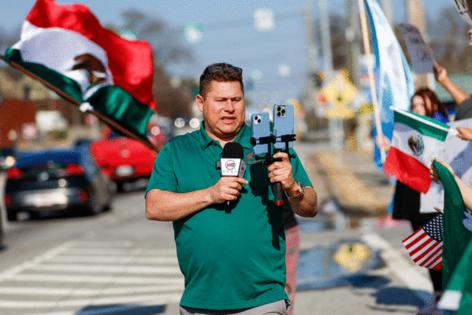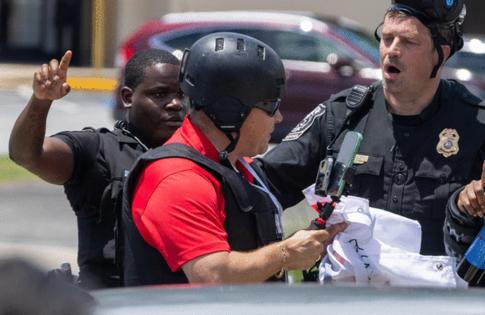Hispanic reporter arrested at protest now in ICE custody, faces deportation
Published in News & Features
ATLANTA — An Immigration and Customs Enforcement (ICE) database shows that Mario Guevara, the influential Spanish-language journalist who livestreamed his own arrest at a weekend protest outside Atlanta, is now in the agency’s custody.
The immigrant from El Salvador, who built a mass following on social media through his work documenting ICE raids, will now have to fight in immigration court for his right to remain in the country and ward off deportation.
It is not clear where Guevara is being held.
Online records show that Guevara was released from the DeKalb County Jail, where he was detained following his arrest at the protest, at 7:35 a.m. Wednesday.
A local judge had granted Guevara a bond Monday, but the journalist remained in detention because ICE had issued a detainer, formally requesting the DeKalb jail to hold Guevara for at least 48 more hours to give immigration agents time to pick him up.
It now appears the pickup occurred earlier Wednesday morning, mere hours before the detainer was set to expire.
At a news conference Tuesday, Giovanni Diaz, one of Guevara’s attorneys, said that if his client was taken into ICE custody he would likely spend some time at the agency’s downtown field office before being transferred to one of two South Georgia immigrant jails: the Stewart Detention Center or the Folkston ICE Processing Center.
Diaz added that Georgia’s immigrant detention facilities are “overwhelmed.”
“People are sleeping on the floor. Some detention centers don’t have enough food,” he said. “My job is to try to get people out of those hell holes. So, it’s not fun. If anybody could handle it and be in good spirits, it’s Mario … I think somebody like him who’s faith driven and mission driven is somebody who’s prepared to handle whatever those conditions may be.”
Guevara’s case has drawn widespread attention, including from an international nonprofit that defends the rights of journalists.
In a statement, Katherine Jacobsen of the Committee to Protect Journalists said she was “outraged” by Guevara’s treatment and called for his immediate release.
Jacobsen called his detention “a crude form of censorship.”
At the Tuesday news conference, Guevara’s daughter, Katherine Guevara, 27, said it was “terrifying” to learn that ICE was targeting her father.
“We’ve always been very, very close. And I just couldn’t believe it,” she said.
Local police charged Guevara with three misdemeanors for his behavior at the pro-immigrants’ rights protest: obstruction of law enforcement, unlawful assembly and pedestrian walking on or along a roadway.
In arrest warrants obtained by The Atlanta Journal-Constitution, Doraville police said the journalist ignored repeated instructions to stay off the street and to leave the site of the protest after it had been declared an unlawful assembly.
According to police, Guevara was part of a large group walking on Chamblee Tucker Road toward I-285. The group tried to physically push past law enforcement officers but were stopped, police said.
“Officers gave orders to disperse, then told the group that assembly was unlawful, and the officers then deployed (tear) gas. Officers then herded the group out of the roadway to a Kroger parking lot, then ordered the group to disperse,” the arrest warrant reads.
“Instead, (Guevara) re-entered the roadway, trying to livestream the event on his phone. When told to go back, (Guevara) did so, but then again entered the roadway and filmed the event,” the warrant said.
In Diaz’s view, Guevara’s livestream shows him acting compliant and respectful around law enforcement.
“He didn’t do anything illegal. The only thing he was doing was documenting the police’s actions. So, why was he arrested?” he said. “He has always complied with the law. His record is impeccable in this country. So, this arrest is concerning.”
Diaz said that although Guevara has work authorization and a path to a green card through his U.S. citizen son, he still lacks permanent legal status in the country.
In 2012, a court denied Guevara’s application for asylum and ordered him deported, but the journalist went on to benefit from administrative closure, a legal procedure that allows an immigration judge to temporarily suspend removal proceedings.
The AJC has reached out to Diaz and ICE for comment.
©2025 The Atlanta Journal-Constitution. Visit at ajc.com. Distributed by Tribune Content Agency, LLC.










Comments